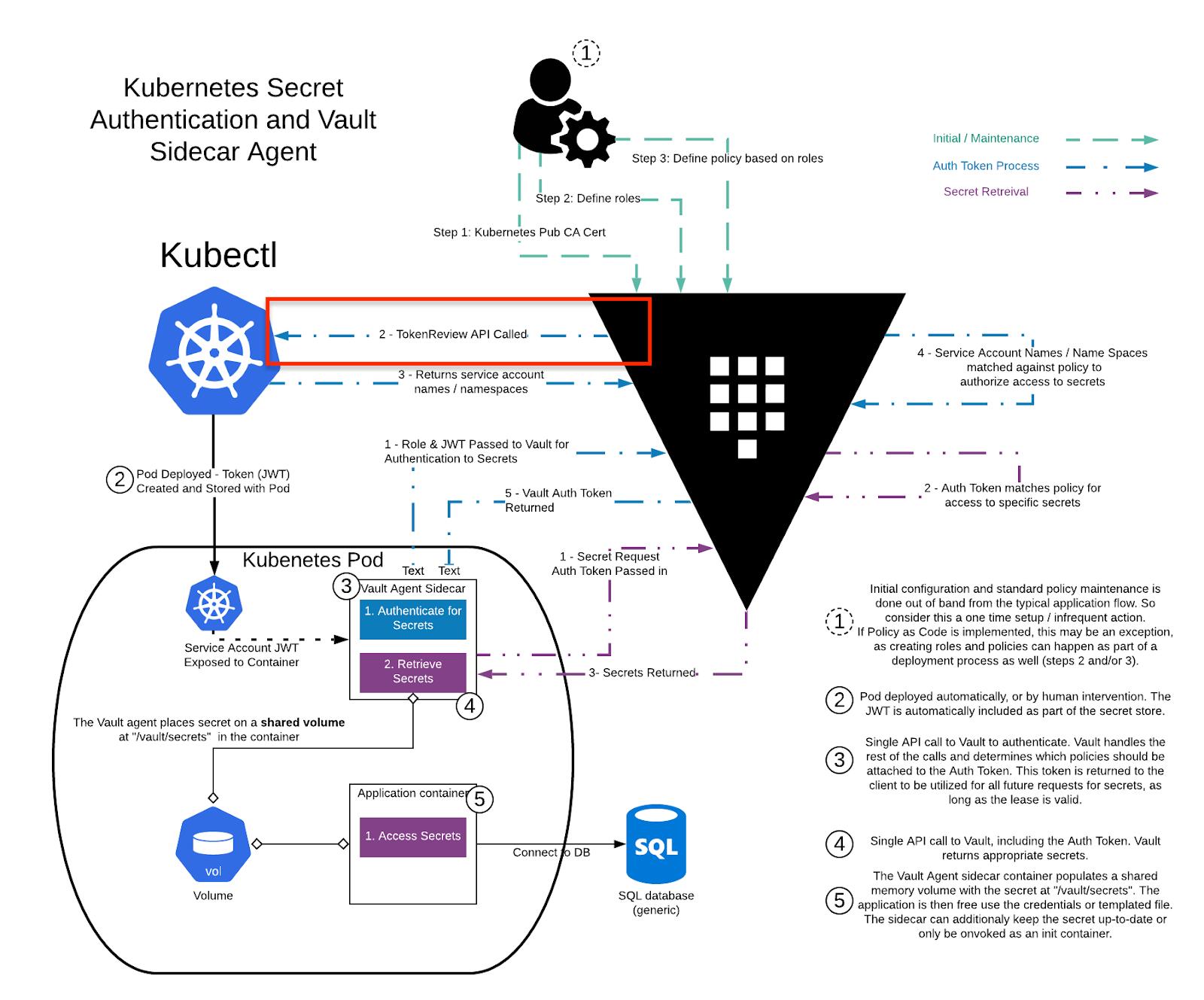I am trying to explore vault enterprise but getting permission denied for sidecar when I use the vault enterprise but seems to work fine when I tried to use local vault server.
Here is the repository that contains a working example with the local vault vault-sidecar-injector-app

Vault config
export VAULT_ADDR="https://vault-cluster.vault.c1c633fa-91ef-4e86-b025-4f31b3f14730.aws.hashicorp.cloud:8200"
export VAULT_NAMESPACE="admin"
#install agent
helm upgrade --install vault hashicorp/vault --set "injector.externalVaultAddr=$VAULT_ADDR"
vault auth enable kubernetes
# get certs & host
VAULT_HELM_SECRET_NAME=$(kubectl get secrets --output=json | jq -r '.items[].metadata | select(.name|startswith("vault-token-")).name')
TOKEN_REVIEW_JWT=$(kubectl get secret $VAULT_HELM_SECRET_NAME --output='go-template={{ .data.token }}' | base64 --decode)
KUBE_CA_CERT=$(kubectl config view --raw --minify --flatten --output='jsonpath={.clusters[].cluster.certificate-authority-data}' | base64 --decode)
KUBE_HOST=$(kubectl config view --raw --minify --flatten --output='jsonpath={.clusters[].cluster.server}')
# set Kubernetes config
vault write auth/kubernetes/config \
token_reviewer_jwt="$TOKEN_REVIEW_JWT" \
kubernetes_host="$KUBE_HOST" \
kubernetes_ca_cert="$KUBE_CA_CERT" \
issuer="https://kubernetes.default.svc.cluster.local" \
disable_iss_validation="true" \
disable_local_ca_jwt="true"
vault auth enable approle
# create admin policy
vault policy write admin admin-policy.hcl
vault write auth/approle/role/admin policies="admin"
vault read auth/approle/role/admin/role-id
# generate secret
vault write -f auth/approle/role/admin/secret-id
#Enable KV
vault secrets enable -version=2 kv
I can see the role and policy

Admin policy
Here is the admin policy for the enterprise
path "*" {
capabilities = ["create", "read", "update", "delete", "list", "sudo"]
}
Deploy Script for helm
here is the deploy script, tried hcp-root root policy but no luck
RELEASE_NAME=demo-managed
NAMESPACE=default
ENVIRONMENT=develop
export role_id="f9782a53-823e-2c08-81ae-abc"
export secret_id="1de3b8c5-18c7-60e3-24ca-abc"
export VAULT_ADDR="https://vault-cluster.vault.c1c633fa-91ef-4e86-b025-4f31b3f14730.aws.hashicorp.cloud:8200"
export VAULT_TOKEN=$(vault write -field="token" auth/approle/login role_id="${role_id}" secret_id="${secret_id}")
vault write auth/kubernetes/role/${NAMESPACE}-${RELEASE_NAME} bound_service_account_names=${RELEASE_NAME} bound_service_account_namespaces=${NAMESPACE} policies=hcp-root ttl=1h
helm upgrade --install $RELEASE_NAME ../helm-chart --set environment=$ENVIRONMENT --set nameOverride=$RELEASE_NAME
also tried with root token
RELEASE_NAME=demo-managed
NAMESPACE=default
ENVIRONMENT=develop
vault write auth/kubernetes/role/${NAMESPACE}-${RELEASE_NAME} bound_service_account_names=${RELEASE_NAME} bound_service_account_namespaces=${NAMESPACE} policies=hcp-root ttl=1h
helm upgrade --install $RELEASE_NAME ../helm-chart --set environment=$ENVIRONMENT --set nameOverride=$RELEASE_NAME
Sidecar config
With namespace annotation, as my understanding namespace is required
vault.hashicorp.com/namespace - configures the Vault Enterprise namespace to be used when requesting secrets from Vault.
https://www.vaultproject.io/docs/platform/k8s/injector/annotations
vault.hashicorp.com/namespace : "admin"
Error
| Error making API request.
|
| URL: PUT https://vault-cluster.vault.c1c633fa-91ef-4e86-b025-4f31b3f14730.aws.hashicorp.cloud:8200/v1/admin/auth/kubernetes/login
| Code: 403. Errors:
|
| * permission denied
Without namespace annotation getting below error
| URL: PUT https://vault-cluster.vault.c1c633fa-91ef-4e86-b025-4f31b3f14730.aws.hashicorp.cloud:8200/v1/auth/kubernetes/login
| Code: 400. Errors:
|
| * missing client token
Even enabling debug logs vault.hashicorp.com/log-level : "debug" does not help me with this error, any help or suggestions will be appreciated.
Also tried https://support.hashicorp.com/hc/en-us/articles/4404389946387-Kubernetes-auth-method-Permission-Denied-error
So seems like I am missing something very specific to the vault enterprise






 已为社区贡献20439条内容
已为社区贡献20439条内容

所有评论(0)